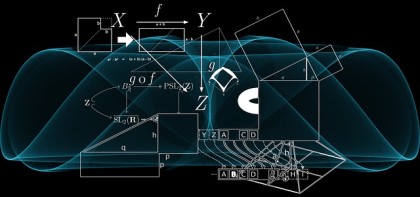You've got a meeting tomorrow, in Manhattan, with a very important client. People manage this sort of thing all the time, right? Easy as pie. Only, suppose you can't communicate with your client. Not now, not tomorrow until you meet her face to face. You don't have a time or a location for your meeting. You know this, your client knows this, and you both know that the other knows. Where and when will you be? … [Read more...] about Science in Review: The Linguistic Match Game
linguistics
Science Corner: Arithmophobia & Other Language Barriers
For everyone who blanches at binomials, cringes at coefficients or detests derivatives: you're not alone! Even scientists may avoid math if they can, according to a study on the effect of equation density on the likelihood a scientific publication will be cited by other scientists. (Original paper here) The effect is small; for every additional equation per page, a paper is 5% less likely to be referenced. Still, the result is notable because it was observed in the physics literature, a discipline generally associated … [Read more...] about Science Corner: Arithmophobia & Other Language Barriers
Can Scientists Talk About Religion?
Last month, I blogged about the religious discrimination lawsuit filed by astronomer Martin Gaskell against the University of Kentucky. I included a quote from Elaine Howard Ecklund's book Science vs. Religion: What Scientists Really Think about the degree to which religious scientists feel they can be open about their faith and beliefs. Now, I want to return to Ecklund's book and discuss one of her conclusions that I have found very insightful: nonreligious scientists have an extremely limited language for discussing … [Read more...] about Can Scientists Talk About Religion?
Week in Review: Word of the Year Edition
What are you reading, watching, thinking about this week? Anything special with some time off or is there too much going on with the holiday? As usual, here's a few which have been on our mind. Let us know your thoughts on any/all of them. In addition, if you have items you'd like us to consider for the top five, add them in the comments or send them to Tom or Mike. 1. What did the Oxford University Press select as its 2009 "word of the year"? -- Part of the The Higher-Ed News Quiz (Chronicle of Higher … [Read more...] about Week in Review: Word of the Year Edition
Week in Review – gao kao, google books, and more!
This week's Week in Review explores Google's Book Search, China's gao kao ("high test"), a call for papers on mentoring, and an article about linguistics and dying languages. If you'd like to contribute to next week's Review, add your link(s) in the comments, or send them to Tom or Mike directly. From Tom Adam Smith: What's Next for Google Book Search? (Chronicle of Higher Education, 06/12/09): Do you use Google Books to take a preview and/or search materials? Is your institution partnering with Google Book … [Read more...] about Week in Review – gao kao, google books, and more!

